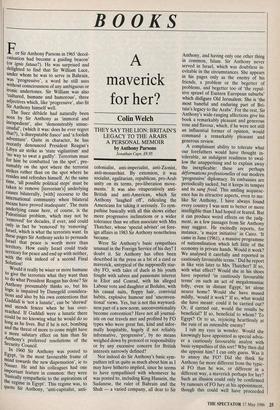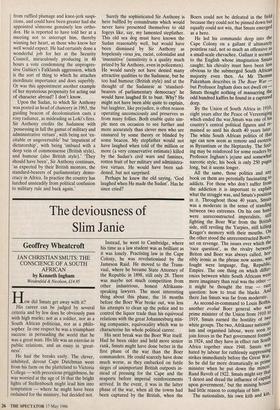BOOKS
A maverick for her?
Colin Welch
THEY SAY THE LION: BRITAIN'S LEGACY TO THE ARABS A PERSONAL MEMOIR by Anthony Parsons For Sir Anthony Parsons in 1965 `decol- onisation had become a guiding beacon' (or ignis fatuus?). He was surprised and delighted to find that Sir William Luce, under whom he was to serve in Bahrain, was 'progressive', a word he still uses without consciousness of any ambiguous or ironic undertones. Sir William was also cultured, humane and humorous', three adjectives which, like 'progressive', also fit Sir Anthony himself well. The Suez debacle had naturally been seen by Sir Anthony as 'immoral and inexpedient', also 'demonstrably unsuc- cessful', (which it was: does he ever regret that?), 'a disreputable fiasco' and 'a foolish adventure'. Quite in character, he has recently denounced President Reagan's Libya air strike as 'state vigilantism' and no way to swat a gadfly'. Terrorism must for him be combatted 'on the spot', pre- sumably on the spot where the terrorist strikes rather than on the spot where he resides and refreshes himself. At the same time, 'all possible political steps' must be taken to remove [terrorism's] underlying causes bilaterally, [with] recourse to the international community when bilateral means have proved inadequate'. The main underlying cause here, of course, is the Palestinian problem, which may not be removed' for decades, if ever, and could only in fact be 'removed' by 'removing' Israel, which is what the terrorists want. In these pages Sir Anthony seeks to persuade Israel that peace is worth more than territory. How easily Israel could trade territory for peace and end up with neither, with the risk indeed of a second Final Solution!
Would it really be wiser or more humane to give the terrorists what they want than to do what President Reagan has done? Sir Anthony presumably thinks so, but his logic is impaired by Danegeld considera- tions and also by his own contentions that Gaddafi is 'not a lunatic', can be 'shrewd' and mends fences when he has over- reached. If Gaddafi were a lunatic there could be no knowing what he would do so long as he lives. But if he is not, bombing and the threat of more to come might have a more salutary effect on him than Sir Anthony's preferred resolutions of the Security Council. In 1960 Sir Anthony was posted to Egypt, 'in the most favourable frame of mind towards the new dispensation', ie to Nasser. He and his colleagues had one Important feature in common: they were `basically sympathetic to the aspirations of the regime in Egypt'. This regime was, to quote Sir Anthony, 'anti-capitalist, anti-
Jonathan Cape, f9.95
colonialist, anti-imperialist, anti-Zionist, anti-monarchist. By extension, it was socialist, egalitarian, republican, pro-Arab unity on its terms, pro-liberation move- ments.' It was also vituperatively anti- British and anti-American, which Sir Anthony 'laughed off, ridiculing the Americans for taking it seriously. To sym- pathise basically with all this shows either more progressive inclinations or a wider tolerance than we often associate with Mrs Thatcher, whose 'special adviser' on fore- ign affairs in 1983 Sir Anthony nonetheless became.
Were Sir Anthony's basic sympathies unusual in the Foreign Service of his day? I doubt it. Sir Anthony has often been described in the press as a bit of a card or maverick, untypical of the supposedly star- chy FO, with tales of duels in his youth fought with sabres and passionate interest in Eliot and Conrad, with his alleged Labour vote and daughter at Bedales, with his casual suits, floppy hair, convivial habits, explosive humour and 'unconven- tional' views. Yes, but is not this wayward- ness part of a new norm, unconventionality become convention? Have not all journal- ists on our travels met and profited by FO types who were great fun, kind and infor- mally hospitable, hugely if not reliably informative, 'progressive', by no means weighed down by protocol or responsibility or by any excessive concern for British interests narrowly defined?
Nor indeed do Sir Anthony's basic sym- pathies tell us quite as much about him as I may have hitherto implied, since he seems to have sympathised with whomever he was posted to, including King Hussein, the Sudanese, the ruler of Bahrain and the Shah — a varied company, all dear to Sir Anthony, and having only one other thing in common, Islam. Sir Anthony never served in Israel, which was doubtless in- evitable in the circumstances. She appears in his pages only as the enemy of his friends, a problem or the begetter of problems, and begetter too of 'the repul- sive sprawl of Eastern European suburbs' which disfigure Old Jerusalem. She is 'the most baneful and enduring part of Bri- tain's legacy to the Arabs'. For the rest, Sir Anthony's wide-ranging affections give his book a remarkably pleasant and generous tone and flavour, which, if he were not still an influential former of opinion, would command a remarkably pleasant and generous review.
A complaisant ability to tolerate what our forefathers would have thought in- tolerable, an indulgent readiness to swal- low the unappetising and to explain away the inexplicable: these are perhaps deformations professionelles of our modern `progressive' diplomacy. Its embassies are periodically sacked, but it keeps its temper and its sang froid. This smiling acquiesc- ence has its attractive aspects, even to me: like Sir Anthony, I have always found every country I was sent to better or more intelligible than I had hoped or feared. But it can produce weird effects on the judg- ment, as a few passages from Sir Anthony may suggest. He excitedly reports, for instance, 'a major initiative' in Cairo. 'It came in June (1961), a massive programme of nationalisation which left little of the economy in private hands. Would it work? We analysed it carefully and reported in cautiously favourable terms.' Did he report in like vein later to Mrs Thatcher? If so, with what effect? Would she in his shoes have reported 'in cautiously favourable terms' on such an act of megalomaniac folly, even in distant Egypt, let alone nearer home? Would she have mused mildly, 'would it work?' If so, what would she have meant: could it be carried out? Or, if carried out, would the results be beneficial? If so, beneficial to whom? To Egypt? Or to us, rejoicing heartlessly at the ruin of an ostensible enemy?
I rub my eyes in wonder. Would she knowingly have appointed as special advis- er a cautiously favourable analyst with basic sympathies of this sort? Why then did she appoint him? I can only guess. Was it to annoy the FO? Did she think Sir Anthony far more different from the typic- al FO than he was, or different in a different way, a maverick perhaps for her? Such an illusion could only be confirmed by rumours of FO fury at his appointment, though this could well have proceeded from ruffled plumage and knee-jerk suspi- cions, and could have been greater had she appointed someone genuinely less ortho- dox. He is reported to have told her at a meeting not to interrupt him, thereby winning her heart, as those who know her well would expect. He had certainly done a wonderful job for her at the Security Council, miraculously producing in 48 hours a vote condemning the unprogres- sive Galtieri's Falklands aggression, which is the sort of thing to which he attaches inordinate importance and does superbly. Or was this appointment another example of her mysterious propensity for acting out of character abroad? I don't know.
Upon the Sudan, to which Sir Anthony was posted as head of chancery in 1963, the guiding beacon of decolonisation casts a rosy radiance, as misleading as Loki's fires. Sir Anthony credits the Sudanese with `possessing in full the gamut of military and administrative virtues', with being not 'ex- citable or ungovernable' but 'impatient of dictatorship', with being 'imbued with a deep vein of commonsense (British style), and humour (also British style).' They should have been', Sir Anthony continues, `as expected by their British mentors, the standard-bearers of parliamentary demo- cracy in Africa. In practice the country has lurched unsteadily from political confusion to military rule and back again.' Surely the sophisticated Sir Anthony is here baffled by conundrums which would never have presented themselves to old fogeys like, say, my lamented stepfather. This old sea dog must have known the Sudan reasonably well, but would have been dismissed by Sir Anthony as hopelessly vieux jeu, racist, colonialist and `insensitive' (sensitivity is a quality much prized by Sir Anthony, even in policemen). He would surely not have denied many attractive qualities to the Sudanese, but he too had humour (British style) and at the thought of the Sudanese as 'standard- bearers of parliamentary democracy' he would have laughed fit to bust. Why? He might not have been able quite to explain, but laughter, like prejudice, is often reason operating unconsciously and preserves us from many follies. Both enable quite sim- ple men on occasion to see further and more accurately than clever men who are ensnared by some theory or blinded by some beacon. My stepfather would not have laughed when told of the million or more (a very conservative estimate) killed by the Sudan's civil wars and famines, rotten fruit of her military and administra- tive virtues. He would have been sad- dened, but not surprised.
Perhaps he knew the old saying, 'God laughed when He made the Sudan'. Has he since cried?



















































 Previous page
Previous page